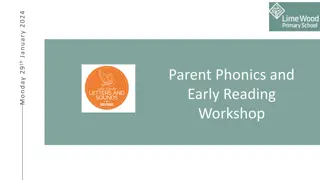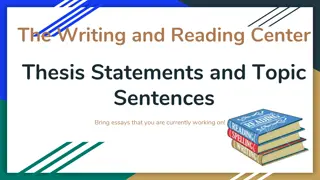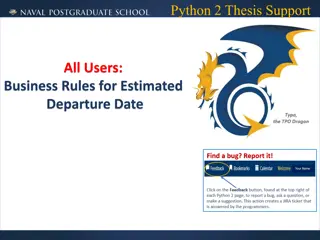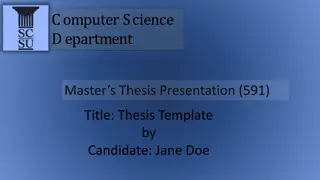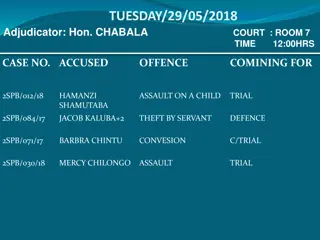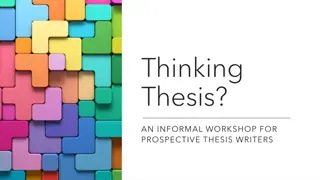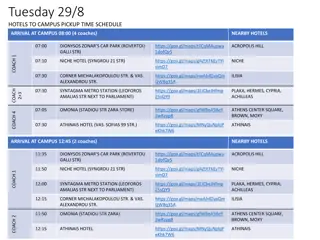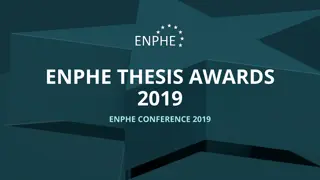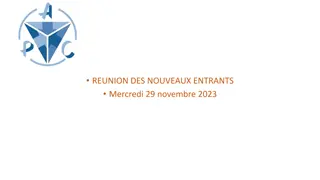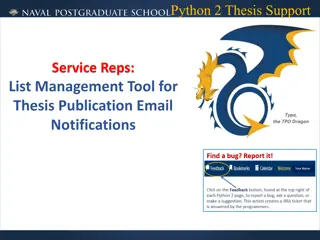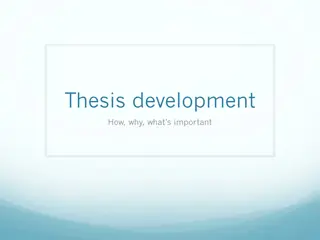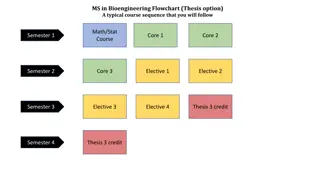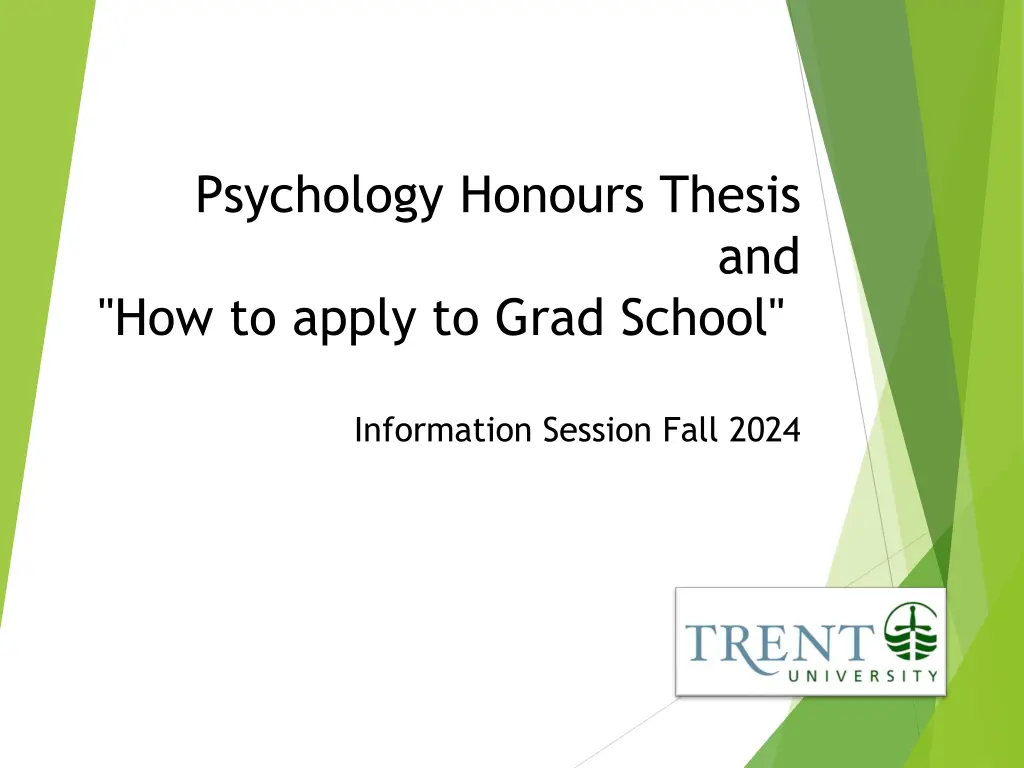
Psychology Honours Thesis and Grad School Application Guide
Explore the world of psychology honors thesis and graduate school applications through seminars, research, and mentorship. Gain insights on thesis workload, admission requirements, finding supervisors, and more to enhance your academic journey in fall 2024.
Download Presentation

Please find below an Image/Link to download the presentation.
The content on the website is provided AS IS for your information and personal use only. It may not be sold, licensed, or shared on other websites without obtaining consent from the author. If you encounter any issues during the download, it is possible that the publisher has removed the file from their server.
You are allowed to download the files provided on this website for personal or commercial use, subject to the condition that they are used lawfully. All files are the property of their respective owners.
The content on the website is provided AS IS for your information and personal use only. It may not be sold, licensed, or shared on other websites without obtaining consent from the author.
E N D
Presentation Transcript
Psychology Honours Thesis and "How to apply to Grad School" Information Session Fall 2024
Contact Information Honours Thesis Coordinator: Professor Kevin Peters kevinpeters@trentu.ca Psychology Dept. Coordinator: Robyn Calvert robyncalvert@trentu.ca
To be discussed Honours Thesis Introductions What is an honours thesis? Why do an honours thesis? Admission requirements Application process Finding a potential supervisor Timeline Grad School What is grad school? Types of degrees Curriculum vitae (CV) GRE Reference letters Personal statement Finding potential supervisors Funding/Scholarships
What is an honours thesis? Four-Year Honours Degree Coursework vs. thesis option Thesis is more than just a big paper Workload is high! (PSYC 4020D = app. 16 hours per week for 2 semesters)
What is an honours thesis? Thesis requires the student to: Participate in thesis seminars throughout year Search, read and review relevant literature Plan an empirical study Write a substantial thesis proposal Collect and analyze data Report the results via written, oral and poster presentations
PSYC 4010Y vs. 4020D PSYC 4010Y is only for students doing a Joint Honours Thesis with Psychology and another program (1 credit from Psychology, 1 from the other program) If you are interested in PSYC 4010Y contact Robyn Calvert in the Psychology Office Note: You do not have to do a Joint Honours Thesis if you are a joint PSYC major, you are eligible to complete 4020D
Why do an honours thesis? Good If you are planning to go on to a graduate program in psychology (or many other social science-based programs) Competitive edge in job market (shows marketable skills) Are unsure of future goals (don t limit your options) Networking with professors, better letters of reference Research is fun, educational and stimulating - the best educational experience we offer
Admission Requirements For admission to PSYC 4020D A grade of 75% or higher in each of PSYC 3016H and 3017H (or in PSYC 3015Y) At least 0.5 credit from each of the A2, B2, A3, and B3 categories (see next slide). 75% average over all Psychology courses. Permission of Psychology Department. Some faculty supervisors have specific pre- requisites for content courses, etc.
Page 453 of the Academic Calendar (2024-25)
Application process You must apply for the Psychology Honours Thesis Program. Forms are available from the Psychology Office and online. Limited space. Application deadline for 2025AY: TBD March 2025 email to robyncalvert@trentu.ca, in the Psychology Office, DNA/LHS C 104.
Finding a potential faculty supervisor Thoughts . Your academic career begins in undergraduate studies, Important - be professional and respectful with your colleagues and professors. Networking is an important skill. in life and in getting into graduate programs start now! Approach faculty whose research work interests you.
Finding a potential faculty supervisor Specifics . Identify faculty members with whom you are most interested in working. Look for a good fit personally and professionally. see online for faculty research interests. Suggestion: Be open to working with a faculty member whose research interests do not match with your present interests. Faculty Research https://www.trentu.ca/psychology/faculty-research Contact potential faculty to see if taking on new students. email, make appointment during office hours, etc.
Finding a potential faculty supervisor Finalizing application to program . Once you have a faculty member willing to supervise you Complete, sign, and have the faculty member sign the application form. Submit form to Laura McMaster in the Psychology Office. This is your application to enter the thesis program. Acceptance is confirmed only after all course requirements are met.
Timeline Application forms are available as of today (in this meeting, from the Psychology Office or online). https://www.trentu.ca/psychology/programs/undergra duate/honours-thesis-information Application deadline for 2025AY: TBD March 2025 (email to: robyncalvert@trentu.ca in the Psychology Office, LHS C 104). If you meet course requirements, you will be notified late May when your marks become available. If you are completing course requirements in the summer, you may apply after the March 4thdeadline and your application will be considered when summer final grades are available.
Applying to Graduate School Big thanks to Dr. Neil Fournier - This part of the presentation is a condensed version of one of his presentations on this topic!
Graduate School: What to expect and what is it about? Different schedule, different focus Classes are important, but not as important as your research. Your focus should be on the work you do between classes this is when your much of your scholarship happens. Take a moment to really think about why you to complete a graduate degree?
Types of Degrees Experimental (social, development, cognitive, health, neuroscience) Clinical (child stream, adult stream, or both) Very competitive (300-600, take around 6-8 applicants) Some funding Psy.D (Doctor of Psychology) Clinical treatment-oriented degree; Research is minor focus Usually, no funding and costly Counselling Other (industrial/organization, quantitative)
Find schools & supervisors What type of degree do you want to do? Which schools offer this? Research supervisors whose research aligns with your interests Make a list of where you will apply to
Curriculum Vitae (CV) Sections Education Research interests Thesis/publications, conference/poster presentations Research and lab experience Professional experience (put academic experience first) Scholarships/academic awards Volunteer work/community service, University involvement Additional skills, info, languages (only if you speak more than one language)
Graduate Record Exam (GRE) Two Types: General Verbal Reasoning Quantitative Reasoning Analytical Writing Subject (Psychology) Many, but not all grad programs require scores for one or both of these tests https://www.ets.org/gre.html
Reference Letters Not all references are created equal Many cases: Your honours thesis supervisor should be one of these references Someone who can comment on your: Writing skills, presentation and communication skills, research potential Pick someone who knows you WELL. Who understands what you have DONE in psychology, what you strive to BECOME Work hard at forming a strong relationship with them, show them what you can do
Making the Request for Reference Letters Be organized (schools have different deadlines and requirements for letters) Be respectful of referee s time (ask way IN ADVANCE) Be appreciative Ask if they can write you a STRONG letter Give them a list of things to mention or what exactly the school(s) will be looking for, possibly even strengths/weaknesses and specific examples May also be helpful to give them your CV, up-to-date transcript, and research/personal statement for any scholarship/graduate program you are applying too
Personal Statement Very important! This is your opportunity to be more than grades, test scores, etc. Customize somewhat for each school. Every school has different requirements: length, topics, format, etc. Make sure to follow these requirements! If not, may tell the person reading you cannot follow instructions, or not that interested in the program The committee will use this to determine your fit to their program They will examine the clarity and focus of your statement They will examine your writing and communication skills Basic goal: convince your potential advisor to offer you an interview or admission into their program Remember, your committee/supervisor will be reading many other statements!
Approaching Potential Supervisors Introduce yourself, mention you will be applying Outline your interests (be specific) Attach your CV, transcript(s), and GRE scores Offer to meet with them, but be clear that you understand if they re too busy or if it s not possible How do your interests fit with theirs? Make it clear you ve read their work Recommendation: start doing this between May-October the year before you would like to start Why? Because you can apply to one of the tri-agencies (NSERC, CIHR, SSHRC) and already have a project in my mind
Funding/Scholarships Federal: Tri-Council Agencies Natural Sciences and Engineering Research Council (NSERC) Social Sciences and Humanities Research Council (SSHRC) Canadian Institutes of Health Research (CIHR) Provincial Ontario Graduate Scholarship (OGS) Institutional Research assistantship, graduate teaching assistantship https://www.trentu.ca/graduatestudies/
How to pick a graduate program? Check out schools online Why is one program 'better' than another? Prestigious school? More interesting city? Closer to home? Supervisor is a big name in the field? Positive and successful grad school experience is dependent on the quality and style of support and guidance that you will receive from your advisor/supervisor

